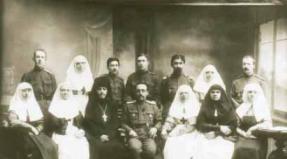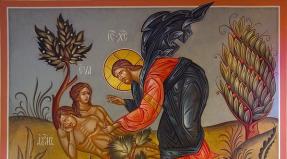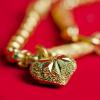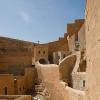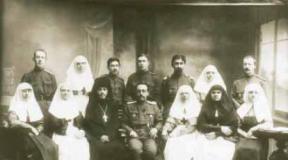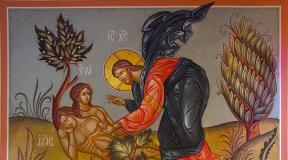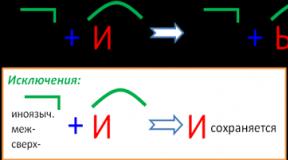Worships idols. The ABC of salvation is idolatry. Tanakh about idolatry
What is idolatry?
What is idolatry and how does it affect the worship of God? Forms of idolatry and how the Bible explains the meaninglessness of idolatry.
Idol, idolatry
An idol is an image or symbol of something material or imaginary that is the subject of enthusiastic worship.
Idolatry is the veneration of, love for, worship of, or admiration of an idol. Typically, idolatry is directed towards a higher power,
real or imaginary.
This force can be either animate, for example, a person, animal or organization, or inanimate, for example, a force of nature or
lifeless object. Usually idolatry is expressed in some form and is associated with certain rites and rituals.
In the Hebrew language, words were used to designate idols that indicated the method of their manufacture, their worthlessness, or expressed
contempt for them.
Some of these words are translated into Russian as “carved images” of letters. “something cut out”; "cast statue", "cast image", "cast
idol" lit. “something poured or cast”; "worthless idol" lit. "bustle"; "hideous idol" and "hideous idol". Greek word that
often translated as “idol”, it is eidolon.
Not all images are idols
God's law against making images (Ex. 20:4, 5) did not mean that no images or graven images could be made. This is indicated by the fact that Jehovah God later ordered two golden cherubim to be made on the mercy seat of the ark, as well as cherubim to be embroidered on the inside of the ten panels of which the sacred tent was made, and on the curtain that separated the Holy Place from the Holy of Holies (Ex 25:18; 26:1, 31, 33).
Also in Solomon's temple, built according to the drawings that David received under inspiration from God (1Ch 28:11, 12), the walls were decorated with carved images of cherubs, palm trees and flowers.
In the Holy of Holies of this temple stood two gold-covered cherubim of oilwood (1Ki 6:23, 28, 29). The molten sea rested on 12 copper bulls, and
The sides of the brass carts used in the temple were depicted with lions, bulls, and cherubim (1Ki 7:25, 28, 29). On the steps that led to Solomon's throne stood 12 lions (2Ch 9:17-19).
However, these images were not idols; they were not intended for worship. Images inside the sacred tent and later the temple were seen
only priests during the service. Only the High Priest entered the Holy of Holies and only on the Day of Atonement (Heb. 9:7).
Therefore, there was no danger that the Israelites would worship the golden cherubim that were in the sanctuary. These images were only
symbol of the heavenly cherubs. (Compare Heb 9:23, 24.)
And since it was impossible to worship the angels themselves, much less should their images be venerated (Cl. 2:18; Rev. 19:10; 22:8, 9).
Of course, sometimes images that were not created to be worshiped became idols.
For example, the Israelites began to worship the copper snake that Moses made in the desert, and therefore King Hezekiah, faithful to God, crushed it (Nu 21:9;
2Ki 18:1, 4).
The ephod made by Gideon the judge turned out to be a “snare” for him and his household (Jg 8:27).
Images to Help in Worship
Scripture does not permit the use of images as an aid to address God in prayer. This use of images is contrary to the principle that those who wish to serve Jehovah God must worship him in spirit and in truth.—John 4:24; 2Co 4:18; 5:6, 7.
He does not tolerate any mixture of true worship with idolatry. This is evident from the fact that he condemned the worship of the calf, although the Israelites associated such worship with his name (Exodus 32:3-10).
Jehovah God does not share his glory with carved images. (Isa 42:8)
Nowhere in Scripture is it mentioned that Jehovah's faithful servants used any objects to pray to God or
worship him.
However, some point to Hebrews 11:21, which, according to the Catholic Douay Version, states: “By faith Jacob, when he died, blessed each of the sons of Joseph and honored the top of his staff.”
The footnote to this verse states that Jacob "gave relative honor and respect to the top of Joseph's staff" and notes: "Some translators do not
Those who recognize such relative worship distort this verse by translating it as “he bowed down to God, leaning on the top of his staff.”
But this translation and others like it do not distort the text, as is stated in this footnote, but are consistent with the meaning of the Hebrew text in Genesis 47:31 and are accepted
even in some Catholic translations, including the Jerusalem Bible (JB).
Forms of idolatry
The idolatry spoken of in the Bible included such abominable acts as sacred prostitution, child sacrifice,
drunkenness and self-torture to the point of bleeding (1Ki 14:24; 18:28; Jer 19:3-5; Hos 4:13, 14; Am 2:8).
Idols were revered by eating and drinking at festivals and ceremonies in their honor (Ex 32:6; 1Co 8:10), they were bowed to and sacrificed, they were sung and danced in front of them, they were even kissed (Ex 32:8, 18, 19; 1Ki 19:18; Hos 13:2).
In addition, idolaters set tables for false gods (Isa 65:11), offered drink offerings, sacrificial cakes, and offered sacrificial incense (Jer 7:18; 44:17), and performed ceremonial lamentations (Eze 8:14).
One possible reason why the Law prohibited the Israelites from certain activities was because they were related to
idolatry common among neighboring nations.
For example, the Israelites were forbidden to tattoo themselves, make incisions on their bodies, shave their eyebrows, cut their temples short, or mar the edge of their beards (Le 19:26-28; De 14:1).
Idolatry can also take more hidden forms. Among them is greed (Colossians 3:5). A greedy person no longer begins to love the Creator, but what
passionately desires.
Thus, what he wants actually becomes an idol for him. Instead of faithfully serving Jehovah God, man may become a slave to his own belly, that is, carnal desire, and make him his god.—Ro 16:18; Php 3:18, 19.
Since love for the Creator is demonstrated by obedience to him (1 John 5:3), rebellion and presumption are equated with idolatry (1Sa 15:22, 23).
Idolatry before the Flood
Idolatry originated in the invisible realm. One spiritual being clothed with glory, driven by greed, developed such a strong
the desire to become like the Most High, which has alienated itself from its God, Jehovah, and rebelled against him (Job 1:6-11; 1Ti 3:6; cf. Isa 14:12-14; Eze 28:13-15, 17).
The first person guilty of idolatry was Eve. She wanted to eat the forbidden fruit, and this wrong desire prompted her to violate
God's commandment. When Adam allowed his selfish desire to become stronger than his love for Jehovah and then disobeyed him, he also became an idolater.
3:6, 17).
Since the rebellion in Eden, there have been few people who have not desecrated themselves by worshiping idols.
When Adam's grandson Enos lived, idolatry began to manifest itself as people “began to call on the name of Jehovah.”—Ge 4:26.
It is clear that they did not call on Jehovah in faith, as righteous Abel had done many years earlier, for which he was killed by his brother Cain (Ge 4:4, 5, 8).
Apparently, during the time of Enosh, people began to misuse the name of Jehovah God, and this was some form of false worship. Perhaps people called themselves or other people by the name of Jehovah through whom they supposedly worshiped God or idols, considering them a visible means that helped them worship the invisible God.
The Bible does not tell us how widespread idolatry was during the period from the days of Enosh to the Flood, but the situation certainly grew steadily worse, for in the days of Noah “Jehovah saw that the people of the earth were steeped in wickedness, and that every thought of their hearts was constantly directed toward only for evil."
This was facilitated not only by the sinful inclinations of people. Materialized angels had a strong detrimental influence on the world of that time.
who had intimate relations with human daughters, and their hybrid descendants, the Nephilim (Ge 6:4, 5).
Idolatry in the Time of the Patriarchs
Although all the people who practiced idolatry perished in the Flood, it reappeared. At the head of the revived idolatry was Nimrod,
“a mighty hunter who resists Jehovah” (Ge 10:9).
Without a doubt, it was under the leadership of Nimrod that the construction of Babylon and its tower, apparently a ziggurat, began, intended for
idolatry.
Jehovah God frustrated the plans of the builders by confusing their language. Having ceased to understand each other, they stopped building the city and dispersed.
However, the idolatry that originated in Babylon was not put to an end. Wherever those builders went, they brought with them false
religious views (Ge 11:1-9).
The Chaldean city of Ur, the next city mentioned in Scripture, like Babylon, did not worship the true God, Jehovah. According to archaeological excavations, the patron saint of that city was the moon god Sin.
In Ur lived Terah, the father of Abram (Abraham) (Ge 11:27, 28).
Living among idolaters, Terah may have been one of them, as suggested by Joshua's words to the Israelites centuries later: “In ancient times, your ancestors, among whom was Terah, the father of Abraham and the father of Nahor, lived on the other side of the River and served other gods” (Jos 24:2). Nevertheless, Abraham demonstrated faith in the true God, Jehovah.
Wherever Abraham, and later his descendants, went, they encountered idolatry, which had its roots in the apostasy in Babylon.
Therefore, they were constantly in danger of being desecrated by idolatry. Even Abraham's relatives had idols. Laban, who was father-in-law
Jacob, Abraham's grandson, had teraphim, or family idols (Ge 31:19, 31, 32).
Jacob found it necessary to command his household to remove all foreign gods and buried the idols they gave him (Ge 35:2-4).
Perhaps he buried the idols so that none of his household, considering the metal from which they were made to be especially valuable, would use it for any purpose. The Bible does not say whether Jacob melted down or broke the idols before burying them.
Idolatry and a people in agreement with God
As Jehovah told Abraham, his descendants, the Israelites, became strangers in a foreign land, Egypt, and were oppressed there.—Ge 15:13.
They found themselves in a country steeped in idolatry and awash with images. Many of the deities revered in Egypt were depicted with a body
human and animal heads, among them Bast with the head of a cat, Hathor with the head of a cow, Horus with the head of a falcon, Anubis with the head of a jackal and Thoth with the head of an ibis.
The Egyptians revered creatures that lived in water, air and land, and mummified “sacred” animals after death.
After Jehovah God delivered his people from Egypt, he gave them a Law that clearly condemned the widespread idolatry
from other peoples.
The second of the Ten Commandments clearly forbade the making of carvings and any other images of anything in the heavens, on the earth, or in the waters, and the worship of them.
(Ex 20:4, 5; De 5:8, 9)
In giving the Israelites his final instructions, Moses emphasized that it was impossible to make an image of the true God and warned them of a trap
idolatry (Deut 4:15-19).
To prevent the Israelites from becoming idolaters, he also commanded them not to enter into any agreements or marriages with the pagans who lived in
land into which they entered, and destroy them. Everything associated with idolatry, such as altars, sacred pillars and columns, and carved images, also had to be destroyed (Deut 7:2-5).
Moses' successor, Joshua, gathered all the tribes of Israel at Shechem and called upon them to remove the false gods and serve Jehovah God faithfully. People
He agreed and thereafter served Jehovah God as long as Joshua and the elders who survived him lived.
But then the Israelites fell into apostasy and began to worship the Canaanite gods - Baal, Ashtoreth and the sacred pillar, or Asherah. That's why
Jehovah God was delivering them into the hands of their enemies.
Yet, when the Israelites repented, he, showing mercy, appointed judges for them to deliver them (Jg 2:11-19; 3:7).
During the time of the kings
The Bible does not report that during the reign of the first king of Israel, Saul, his son Ishbosheth, and also David, idolatry was widespread in Israel. Nevertheless, we can conclude that it was still there. For example, Michal, Saul's daughter, had a teraphim (1Sa 19:13).
However, open idolatry spread throughout the kingdom only at the end of the reign of Solomon, the son of David. The king himself pushed the Israelites to him,
who, under the influence of numerous foreign wives, built the heights of Ashtoreth, Chemosh, Milcom and Molech. The people as a whole have become involved in false
worship and began to bow to the idols of these gods (1Ki 11:3-8, 33; 2Ki 23:13).
Because of such idolatry, Jehovah God took the ten tribes from Rehoboam the son of Solomon and gave them to Jeroboam (1Ki 11:31-35; 12:19-24).
Jehovah God assured Jeroboam that if he served him faithfully, he would strengthen his kingdom. However, having become king, Jeroboam was afraid that if he
If his subjects continued to go to Jerusalem to worship, they would rebel against his rule, and therefore introduced the worship of calves (1Ki 11:38; 12:26-33).
The people worshiped calves as long as the ten-tribe kingdom existed, and during the reign of Ahab, the worship of the Tyrian Baal was also introduced into the kingdom (1Ki 16:30-33).
But not everyone became apostates. During the reign of Ahab - when, at the instigation of his wife Jezebel, the prophets of Jehovah were killed with the sword - there were 7,000 people in the country who did not kneel before Baal and did not kiss him. ).
Apart from the report that Jehu eradicated Baal worship from the kingdom (2Ki 10:20-28), there is no information that any of the kings of the ten-tribe kingdom carried out religious reforms in the country.
Neither the rulers nor the people of the northern kingdom listened to the prophets whom Jehovah God repeatedly sent to them, and so the Almighty delivered these hardened idolaters into the hands of the Assyrians (2Ki 17:7-23).
The situation in the kingdom of Judah was not much different, although some kings carried out religious reforms there. Despite the fact that the division
Solomon's kingdom occurred precisely because of idolatry; his son Rehoboam did not learn a lesson from the punishment of Jehovah God and did not shun idolatry.
As soon as Rehoboam's power was established, he - and with him the entire people of the kingdom of Judah - fell into apostasy (2Ch 12:1).
The people built high places, placed sacred columns and pillars on them, and also participated in sacred prostitution (1Ki 14:23, 24). King Abijah, when he fought with Jeroboam, showed faith in Jehovah God and was blessed with victory, but in many ways he acted like his father and predecessor on the throne, Rehoboam.—1Ki 15:1, 3; 2Ch 13:3-18 .
The next two kings of Judah, Asa and Jehoshaphat, faithfully served Jehovah God and sought to eradicate idolatry from their kingdom. But the people of Judah
so steeped in false worship that, despite the efforts of these kings to destroy the high places, they secretly preserved them or built them again (1Ki 15:11-14;
22:42, 43; 2Ch 14:2-5; 17:5, 6; 20:31-33).
The reign of the next king, Jehoram, began with bloodshed and marked a new stage in the history of idolatry in Judah, which was attributed to the influence of his idolatrous wife Athaliah, daughter of Ahab (2Ch 21:1-4, 6, 11).
Athaliah also acted as an adviser to their son Ahaziah. Therefore, during the reign of Ahaziah and then Athaliah, who seized power, idolatry in the kingdom flourished with the approval of the authorities (2Ch 22:1-3, 12).
Early in the reign of Joash, Athaliah was executed and true worship was restored. But after the death of the high priest Jehoiada, the kingdom was under the influence
princes returned to idolatry (2Ki 12:2, 3; 2Ch 24:17, 18). Therefore, Jehovah gave the Jewish troops into the hands of the Syrians who invaded the country, and Joash was killed by his own servants (2Ch 24:23-25).
The execution of God's judgment on Judah and the violent death of Joash undoubtedly made a strong impression on Amaziah, the son of Joash,
and at the beginning of his reign he did what was right in the sight of Jehovah God (2Ch 25:1-4).
But, having defeated the Edomites and taken their idols, he began to serve the gods of the enemies he had defeated (2Ch 25:14).
The payoff for this came when Judah was defeated by the ten-tribe kingdom and Amaziah was killed by the conspirators (2Ch 25:20-24, 27).
Although Azariah (Uzziah) and his son Jotham are said to have generally done right in the eyes of Jehovah God, their subjects continued to worship idols on the high places. -18; 27:1, 2).
Under Ahaz, the son of Jotham, idolatry in Judah reached an unprecedented scale. Ahaz became the first king of Judah who is said to have burned his son, and perhaps even several, as a sacrifice to false gods (2Ki 16:1-4; 2Ch 28:1-4).
As punishment, Jehovah God delivered the Jews into the hands of their enemies. Instead of repenting, Ahaz concluded that the success of the kings of Syria had been granted by their gods, and decided
also make sacrifices to these deities so that they will help him (2Ch 28:5, 23).
Moreover, he locked the doors of Jehovah's temple and broke into pieces the temple furnishings.—2Ch 28:24.
Hezekiah, the son of Ahaz, unlike his father, learned a lesson from the admonition of Jehovah God (2Ch 29:1, 5-11). After becoming king, he immediately began to restore the true worship of Jehovah God.—2Ch 29:3.
During his reign, everything that was associated with false worship was destroyed, not only in the land of Judah and Benjamin, but also in the land of Ephraim and
Manasseh (2Ch 31:1).
Hezekiah's son Manasseh restored idolatry (2Ki 21:1-7; 2Ch 33:1-7).
The Bible does not explain why he did this. Perhaps Manasseh
ascended the throne at the age of 12, he found himself under the bad influence of advisers and princes who were not entirely devoted to Jehovah God.
And yet, unlike Ahaz, having received severe punishment from Jehovah and being captured in Babylon, Manasseh repented and, returning to Jerusalem, carried out religious reforms (2Ch 33:10-16). However, his son Amon again began to offer sacrifices to the carved images (2Ch 33:21-24).
The next king, Josiah, cleansed Judah from idolatry. In Judah and even in the cities of Samaria, places where idols were worshiped were desecrated.
Josiah removed from service the priests and those who offered sacrificial smoke to Baal, the sun, the moon, the zodiac constellations and the entire heavenly army (2Ki 23:4-27; 2Ch 34:1-5).
However, this large-scale campaign against idolatry did not end it forever.
The last four kings of Judah—Jehoahaz, Jehoiakim, Jehoiachin, and Zedekiah—were idolaters (2Ki 23:31, 32, 36, 37; 24:8, 9, 18, 19).
The references to idolatry in the books of the prophets shed light on what happened in the kingdom of Judah in its final years. In the country
There were still places for idolatry, people were engaged in sacred prostitution and sacrificed children (Jer 3:6; 17:1-3; 19:2-5; 32:29, 35; Eze 6:3, 4).
Even the Levites were guilty of idolatry (Eze 44:10, 12, 13). Transferred in a vision to the Temple of Jerusalem, Ezekiel saw there a disgusting “idol of jealousy” and people who worshiped images of crawling creatures and disgusting beasts, as well as the false god Tammuz and the sun (Ezekiel 8:3, 7-16).
Although the Israelites revered idols so much that they sacrificed their own children to them, they pretended to worship Jehovah God, and
believed that no disaster would befall them (Jer 7:4, 8-12; Eze 23:36-39).
Having become mired in idolatry, people in general became so unreasonable that when, in fulfillment of the words of Jehovah, disaster nevertheless came in 607 BC. e.
The Babylonians devastated Jerusalem, they decided that this befell them because they stopped offering sacrificial incense and pouring out drinking offerings to the “queen of heaven” (Jeremiah 44:15-18).
Why Israel Turned to Idolatry
There were several reasons why so many Israelites abandoned true worship over and over again. As one of the works of the flesh, idolatry appealed to the desires of the flesh (Ch. 5:19-21).
Having settled in the Promised Land, the Israelites could see that the pagans who had not completely expelled them, who had much more experience in agriculture, received rich harvests.
Perhaps many of the Israelites asked the Canaanites the reasons for their success and followed their advice on how to please Baal, or the “owner,” of each piece of land (Ps. 107:34-39).
In addition, their marriages with idolaters could lead them to apostasy (Jd 3:5, 6). Sexual immorality associated with idolatry was also a serious temptation for them.
For example, at Shittim on the plains of Moab, thousands of Israelites indulged in immorality and became involved in false worship (Nu 22:1; 25:1-3). And someone
could be seduced by the opportunity to get drunk at the sanctuaries of false gods (Amos 2:8).
In addition, some were attracted by the supposed opportunity to find out the future, because they wanted to receive assurance of a favorable outcome of certain events. So, Saul turned to the woman who called the spirits, and Ahaziah sent to ask Baal-zebub, the god of Ekron (1Sa 28:6-11; 2Ki 1:2, 3).
The futility of idolatry
Scripture repeatedly speaks of the foolishness of relying on gods made of wood, stone and metal. The prophet Isaiah describes the process of making idols and shows the stupidity of a person who uses one part of a tree to prepare food and keep warm, and from the other makes a god from whom he expects help (Isa 44:9-20).
Isaiah wrote that in the day of Jehovah God's wrath, idolaters will throw their worthless idols to the shrews and bats (Isa 2:19-21).
“Woe to him who says to a piece of wood, ‘Wake up!’ and to a dumb stone, ‘Wake up!’” (Hab 2:19). Those who make idols will become like them, that is,
lifeless (Ps. 115:4-8; 136:15-18; see Rev. 9:20).
Attitude towards idolatry
Faithful servants of Jehovah God have always viewed idols with disgust. False gods and idols are often described in derogatory terms in the Bible.
words: they are called useless (1Ch 16:26; Ps 96:5; 97:7), disgusting (1Ki 15:13; 2Ch 15:16), shameful (Jer 11:13; Hos 9:10), and also
an abomination (Eze 37:23).
The expression “abominable idols” is often used, which translates the Hebrew word gillulim, which is related to the word meaning “dung” (1Ki 14:10; Sa 1:17).
This expression of contempt first appears in Leviticus 26:30, and in the book of Ezekiel alone it appears about 40 times, beginning with verse 4 of chapter 6.
Righteous Job understood that if his heart were secretly tempted when he looked at celestial bodies, such as the moon, and if his hand blew kisses, perhaps as a sign of idol worship, then this would be tantamount to denying God and, therefore, idolatry
(Job 31:26-28; cf. Deut 4:15, 19).
Through the prophet Ezekiel, Jehovah God said about the righteous man that he “did not fix his eyes on the abominable idols of the house of Israel,” that is, he did not ask them for anything and did not seek their help (Eze 18:5, 6).
Among the people who avoided idolatry, one can also single out three Jews - Shadrach, Meshach and Abednego, who, even under the threat of death in a fiery furnace, refused to bow to the golden image installed by King Nebuchadnezzar on the plain of Deir (Dan, chapter 3).
The early Christians followed the divinely inspired counsel to “flee idolatry” (1Co 10:14), and those who made idols saw
Christianity is a threat to its profitable business (Ac 19:23-27).
According to historians, while not participating in idolatry, Christians living in the Roman Empire often found themselves in situations similar to those in
which turned out to be three Jews. If these Christians had burned a pinch of incense in recognition of the emperor's divine essence, they could have avoided death. But few agreed to this.
The first Christians clearly understood that if they had returned to idolatry after turning from idols to the true God (1Th 1:9), they would not have entered the New Jerusalem and would not have received life as a reward (Rev 21:8 ; 22:14, 15).
Even today, the servants of Jehovah God must keep themselves from idols (1 John 5:21).
The Bible predicted that there would be a plague on all the inhabitants of the earth.
strong pressure to force them to worship the symbolic “beast and its image.” No one who participates in such idolatry will receive God's gift of eternal life. “The perseverance of the saints is needed here” (Rev 13:15-17; 14:9-12).
Watch a useful video
Exodus 32 chapter
It is worth noting that, obviously, the delay of Moses became the reason for the apostasy among the people of God (see Eze. 12:21-28; Hab. 2: 2-4; Matt. 25: 1-13). Likewise, some will not be ready to meet the Lord when He appears the “second time” (see Heb. 9:28). Many will say on that day, “My master will not come soon,” and will give themselves over to evil (Matt. 24:45-51; Luke 12:37-48; 2 Peter 3:3-18).
The Israelites feared that their leader, on whom they depended, had abandoned them. While Moses was with them to encourage them, exhort them, and support them by example, they were able to maintain a higher level of spiritual life, “walking by faith and not by sight” (2 Cor. 5:7). When his presence was removed from them, a backlash began and the "flesh" gained victory over the "spirit." Although the cloud of dense darkness into which Moses entered as he ascended the mountain with Joshua was visible from the plain, the top of the mountain was illuminated from time to time by lightning from the Divine presence, and it seemed to many in the camp that Moses had deserted them or been consumed by a consuming fire. The ground for the sad manifestation of idolatry.
This experience represents other strikingly contrasting examples so characteristic of the Bible, such as Christ in glory on the Mount of Transfiguration and His disciples in the valley below, in grief and defeat (Matt. 17:1-18). Here, while Moses was on the mountain receiving the tablets of the law and instructions concerning true worship and the high and holy office of the high priest, the people below blatantly turned away from the Lord. Paradoxically, they were led into idolatry by the very man who was called to serve the Lord.
To Aaron. If Moses' brother had been strong in faith and character, this unfortunate event in Israel's history could have been avoided. Aaron's weakness of character and spirit of compromise not only rendered his spiritual leadership ineffective, but also placed him in the position of leader of the rebels.
Make us a god. Because their stay in Egypt had accustomed the Jews to material forms of deity, they found it difficult to trust the invisible God. Although the Hebrew word for “god” here is XElohim, the plural form of the word, some Bible scholars argue that “gods” are here and in v. 4, 8, and 31 should be translated "god", considering that the plural is used to emphasize the fact that the golden calf was a false god in contrast to the Lord, the true God.
He would walk in front of us. Tired of waiting so long at Sinai and eager to continue their journey to the Promised Land, the people demanded a visible god ahead of them to give them confidence and courage (see 1 Samuel 4:3-8). How well it would be if they spent this time of waiting in meditation on the law of God, and thereby prepared their hearts to receive further revelations from Him. If they did this, they would be able to resist this temptation.
Much of the spirit of retreat was generated by the “multitude of foreigners” who joined the Israelites to escape the plagues of Egypt. They were a constant hindrance and snare for Israel (Ex. 12:38; Num. 11:4). They are comparable to the “wicked people” of DA.17:5.
2. Alarmed by the reckless stupidity and threatening attitude of the people, and fearing for his safety, Aaron gave in to the demands of the crowd instead of nobly and courageously upholding the honor of God (see Ex. 23:2). Hoping that they would not give up their property, he demanded a collection of “gold earrings.” But he was mistaken in his hope. Having taken the first step towards compromise, he could no longer retreat.
4. This is your God. "Taurus" seems natural to the Israelites because they witnessed the worship of the Apis bull in Egypt. But the golden calf was apparently a material representation of the true God, and not some pagan deity (see v. 5).
5. Proclaimed. Feeling the approval of the people, Aaron went further, announcing a “banquet.” Ironically, this was supposed to be a “feast to the Lord.” This spirit of compromise, the desire to harmonize the worship of the Lord with idolatry, was not only manifested by Israel on this occasion; it also motivated much of the idolatry that hindered them in the future
(1 Kings 12:26-33; 2 Kings 17:32-33; Zeph.1:5).
6. Got up early. The people were so excited and enthusiastic about their newfound religion that they could not get up early enough to begin the service.
They sat down to eat. Only certain parts of the sacrificial animals were usually burned, the rest were eaten by the worshipers.
Got up to play. It was a sensual act. Pagan sacrificial feasts turned into wasteful orgies (Num. 25:1-9; 1 Cor. 10:7-8). This episode illustrates the war between the flesh and the Spirit that constantly continues in human nature (Rom. 7:23; 8:1-13). From the time the Israelites left Egypt, they lived a spiritual life, relying on the invisible God and resting under His protection. In the end, however, when the restraining influence of the example and leadership of Moses was removed, evil triumphed. They returned to idolatry and the licentiousness that was inextricably linked with pagan worship. Sensual pleasure was masked by religion (2 Tim. 3:4-5). Such a religion is as pleasing to many people today as it was in the era of Israel. And there are still compliant leaders who yield to the desires of the unsanctified and encourage them to sin (PP 317).
7. Your people. God rejected Israel; He no longer spoke of them as “my people” (Ex. 3:10; etc.; cf. Matt. 21:13; 23:28). They broke their covenant with Him and “separated” themselves from His care and guidance (Isa. 59:2). The aversion to sin is inherent in the divine character. God loves the sinner, but hates sin. Moses, being far from the camp, did not know what was happening below.
8. They soon deviated. A few weeks earlier, the people had entered into a solemn covenant with God and promised to obey Him (Ex. 19:8; 24:3). Now this covenant was broken (PP 320). Without a “root” in temptation, people quickly fell into sin (see Matt. 13:20-21). Many, especially among the “multitude of foreigners,” could not resist their old idolatrous habits (see 2 Peter 2:22). The word "stiff-necked" conveys the idea of depravity, as with a horse that refuses to go the right way and resists when the driver pulls the reins to the right or left.
10. Leave Me. God was testing Moses and preparing him for what lay ahead (see Gen. 18:23-32; 32:26-28). This was not the last time he had such an experience (Num. 16:21, 45). Moses felt that God's decision was not final and continued to intercede for his people.
I'll get it from you. The Lord gave Moses the opportunity to choose between his own glory, the honor of God, and the welfare of those under his responsibility (see Matt. 4:8-10). He acted nobly and thus proved his devotion to God and the tasks entrusted to him.
11. Moses began to beg. Moses counters that Israel is still God's people - not his (see v. 7). God has done so much for them; Of course, He will not reject them now, thereby admitting the failure of His own plan. God could not afford to do this for His own name's sake - that was Moses' first request. Moses could not excuse the sin of his people, but he could intercede for their forgiveness (see Job 42:10; Jer. 14:19-21; Ezek. 14:14, 20; Dan. 9:4-11).
12. The surrounding countries learned of the miraculous deliverance of the Jews from Egypt, and as a result they feared what the Lord might yet do for Israel. Therefore, if Israel were destroyed, the Gentiles would rejoice and God would be disgraced. The accusations of the Egyptians would be confirmed that instead of leading the people out into the wilderness to sacrifice (Exodus 5:1-3), He brought them there to be sacrificed (Exodus 10:10). Preventing the Gentiles from triumphing over Israel was Moses' second request.
Remember Abraham. The third request consisted of reminding God of His promises to Abraham (Gen. 15:5; 17:2–8), Isaac (Gen. 26:4), and Jacob (Gen. 28:14; 35:11). These promises were only partially fulfilled by that time and of course God will fulfill His word.
The Lord repented. The Lord was touched by the sincere, selfless prayer of His faithful servant. God could not refuse the prayer of one who thought more about his people than about his own aggrandizement and honor. The character of Moses was revealed, there was a revelation of Divine love (John 3:16; Phil. 2:5-8).
The words “The Lord repented” are a weak attempt to express the Divine desire in human language. Strictly speaking, God cannot change His plans, since He knows “the end from the beginning” (1 Samuel 15:29; Isaiah 46:9-10; 55:11). However, when sinners forsake their sin and turn to Him, when His children plead with Him for mercy and forgiveness, then He truly “repents.” He exchanges wrath for mercy, condemnation for merciful forgiveness (Ps. 105:44-45; Jer. 18:5-10; 26:3; Joel 2:12-14; Jonah 3:9-10; 4:2).
In his hand. That is, in the hands (Deut. 9:15).
When Joshua heard. On his way down, Moses met Joshua, who was staying where Moses had left him six weeks earlier (see Exodus 24:12-18). Together they went down to the camp. Being a warrior, Joshua thought that the sound coming from the camp was a military one, but Moses, warned by the Lord, suspected the true nature of the noise. The last part of the descent from Mount Sinai does not allow the plain below to be seen, so that any sound from the plain was heard before its source could be seen. Perhaps the hills at the base of the mountain created an obstacle to line of sight (see on Ex. 19:1).
He approached. The religious rites of most ancient peoples included dancing. Among the Jews, this sometimes happened solemnly and with dignity, as in the case of David (2 Samuel 6:14), sometimes festively and joyfully (see Exodus 15:20). Among the pagans, however, and especially among the peoples of the East, such dances had a free and lascivious character. Egyptian dancers were professionals in a bad way, and their dancing was sensual and indecent. In Syria, Asia Minor and Babylon, dancing was a wild orgy. It was this kind of dance that the Israelites allowed themselves, which aroused the hot anger of Moses. This was idolatry at its worst. It is not surprising that in anger he threw these two tablets to the ground and “broke them.” By this he showed that since they broke the covenant with God, God also broke His covenant with them (Deut. 9:17; PP 320).
He took the calf. Compare this with the action of Josiah (2 Samuel 23:1-27).
Scattered. Since this "water" was a "stream" that came down from the mountain (Deut. 9:21), and was the only water available, when the Israelites drank it, they swallowed particles of gold. Thus it came to pass that the object of their sin became the instrument of their punishment. (Ps. 7:15-16; 9:16; Prov. 1:31-32; 5:22). In the complete destruction of the golden calf, Moses showed the people the futility and insignificance of their idol (1 Cor. 8:4). If the calf could not save himself, he certainly could not save his worshipers (Ps. 116:3-9; Is. 46:5-7).
To Aaron. Having destroyed the idol, Moses naturally turned to the one whom he left in charge of the people, who was to resist evil and stop this apostasy (Ex. 24:14). Moses did not mean that the people did anything to Aaron; the question was asked reproachfully. If Aaron had taken a firm stand, this retreat might not have happened (PP 316, 317).
You know. Instead of meekly taking responsibility for idolatry, Aaron justified himself by placing the blame on the people. At the same time, he showed himself to be a true descendant of Adam and Eve (Gen. 3:12-13). What a contrast to the spirit of Moses (see on Exodus 32:10-14, 32).
Came out. To further justify his behavior, Aaron implied that a miracle had occurred, that a supernatural force had transformed the gold bars "in the fire" into "this calf." The bewitching power of sin forces sane people to attach rational meaning to their actions. Aaron would have been destroyed for his sin if not for the earnest intercession of Moses (Deut. 9:20). Because of his position as leader, in the absence of Moses, Aaron's sin was even more reprehensible. To whom much has been entrusted, the more will be required of him (Luke 12:48).
Unbridled. Or perhaps “broken free.” Thus, people gave free rein to their wild passions. Moral restraint was completely abandoned. People were practically in a state of rebellion, driving themselves to the point of madness. They became a wild mob and Aaron was responsible for this orgy as he made a calf and declared a holiday.
Their shame. Perhaps some of the Amalekites (see Exodus 17:8-16) were still around to witness this riot and its lewd obscenities.
Then Moses stood. Unable to stop these terrible acts and realizing that something must be done, Moses stood at the "gate of the camp" and called for people to join him in putting down the rebellion. There is no neutral side in the war between good and evil. We are either on the side of God or on the side of Satan. There is no middle (Josh. 24:14-15; 1 Sam. 18:21; Matt. 6:24). The ultimate test that we are on the Lord's side will be our faithfulness when everyone else around us is retreating. (Matt. 7:13-14). Determined piety shows itself in the ability to resist the influence of multitudes. It takes courage to maintain individuality (see Daniel 3:14-18). Among all the brothers, only the “sons of Levi” rallied to the “side of the Lord.” They did not participate in this idolatrous service.
Each one has its own sword. Wherever the Levites encountered those still participating in the licentious rites, they were to “kill” them with the sword, disregarding relationships of family and friendship (Deut. 33:8-9; Ezek. 9:6). Decisive action was necessary to suppress the uprising. Jesus made it clear that no earthly connection should be allowed to stand between us and our duty to Him (Matt. 8:21-22; 10:37). It happened that the place of celebration became the place of death. This quick execution of those who led the people into idolatry was necessary to show to the surrounding nations God's definite displeasure against pagan worship. As for his own people, the Lord had to convince them that iniquity such as this would not be tolerated. If God had allowed this violation to pass without severe punishment, in the future the Jews might have been more willing to succumb to the temptations of idolatry. As Israel's loving protector, God removed from them those who were determined to follow their own path of disobedience, lest they lead others to destruction. At this time, God in His mercy allowed some to perish in order to save many. Moreover, if sin persisted, God could no longer protect them, and they would fall defenseless before their enemies.
Commit yourself. Moses declares Heaven's mercy upon the Levites, who have so zealously joined him in punishing the idolaters. The Hebrew word for sanctification carries with it the idea of being appointed to holy service. Here it also implies God's special "blessing" given to the Levites to be chosen to serve in the sanctuary (Num. 3:5-9; 18:1-7; Deut. 10:8).
The next day. This suggests that the people had finally realized their great guilt and were terrified that every apostate would be killed. Moses' love and pity for his people compelled him to again intercede with the Lord on their behalf. There is a profound lesson here that ministers of the gospel must carefully consider their actions. Just like the shepherds of the flock, they must love their church members and bring them closer to God, they must show people their sins (Isa. 58:1). At the same time, they must sincerely plead with God for forgiveness of sin through the mercy of Christ.
This people. Moses spoke to God about the Israelites as “Your people” (v. 11). Here, thinking of the gravity of sin which made them unworthy to be called the people of God, he addresses them as "this people."
Sorry if not. Thus Moses moved on in his address to God without completing the first part of it. It might be "Then I will be content," or "I will have no more to say." Similar phrases are found in Luke 13:9; 19:42.
Blot me out. So great was Moses' love for his sinning brothers that if he could not prevent their destruction, he did not want to see it (see Num. 11:15). He was ready to be “blotted out of Your book” (Isa. 4:3). He was willing to give his own life if it would help atone for their sin. He was willing to bear their guilt, here and in the Hereafter, to ensure their forgiveness. Paul showed similar selflessness toward the Jews of his day (Rom. 9:1-3). Moses did many noble things, but this was the noblest of all. It is not easy to appreciate the extent of the love of people like Moses and Paul; our limited capabilities cannot comprehend this, just as a small child is unable to comprehend the courage of heroes. Moses is a type of the Good Shepherd, who gave His life for the sheep (John 10:11, 15), who was “cut off from the land of the living; for the transgressions of my people” (Is.53:8; Dan.9:26; John 15:13).
From Your book. This is an appeal to the "book of life" in which the names of all those who claimed to be children of God are recorded (Ps. 69:28; Dan. 12:1; Phil. 4:3; Rev. 3:5; 13:8 ; 17:8; 20:12, 15; 21:27). Those who have fallen away from God, who, because of their unwillingness to forsake sin, become insensitive to the influence of the Holy Spirit (Gen. 6:3; Eph. 4:30; Heb. 10:29; 1 Thess. 5:19), will be erased from the book lives and destroyed.
Who has sinned? In general, the Bible teaches that all must suffer their punishment (Deut. 24:16; 2 Kings 14:6; Ps. 48:7-8; Jer. 31:29-30; Ezek. 18:20). There is only one substitutionary atonement that the Word of God accepts, and that is the Atonement of Jesus Christ, who, being without sin, can be punished for the sins of others (Isa. 53:5-6; John 1:29; 1 Cor. 15:3; Hebrews 9:28; 1 Peter 2:24). In the intercession he made for Israel, Moses symbolized Christ's intercession for sinners. But he could not, like our Lord, bear the guilt of the apostates.
On the day of the visit. It has been suggested that this refers to the statement that none of those who left Egypt would enter Canaan (Num. 14:26-35).
The Lord struck. After the defeat of the 3,000 (v. 28), a plague broke out in the camp. Even this was evidence of Divine mercy to emphasize the danger of yielding to sin. Although God was willing to forgive His people, if forgiveness were obtained very easily, they would be encouraged to commit the crime again. They must see the evil consequences of iniquity. Gentleness was set aside so that persuasion could make a deeper impression.
In all of God's dealings with us today we must study to understand His divine will and learn the lessons He reveals for our instruction. In this way He would develop and strengthen our character.
Based on materials from the SDA Bible Commentary
Idolatry as a personality quality is the tendency to abandon faith in the true God or replace Him with some fictitious creature, worship false gods and idols, make sacrifices to them, place hopes in them.
Someone asked a Sufi: - Teach me to pray. The Sufi replied: “Not only are you already praying, but part of your mind is constantly occupied with it.” “I don’t understand what you mean.” I could not pray to the Lord for several months due to some reasons. “You said: “Teach me to pray,” you didn’t say anything about the Lord. The prayer you have been involved in for several months is a prayer to your neighbors, as you constantly think about what they might think of you. It was a continuous prayer to the idol of money, for that is what you crave. You also pray to an idol for your own safety and for many others. Since you have so many gods to whom you are constantly forced to pray, it is not surprising that you have no room or time left for any other prayer.
Idolatry is the tendency to create substitutes for God – idols – in one’s heart. An idol is an impostor who takes the place of God. For an idolater, the idol clearly takes first place. What is the danger - it can appear in any area of our life. An idol can be a person, money, material goods, work, actions or relationships. And then some idol becomes a source of human happiness, peace and well-being. A person begins to pay more attention to the idol than to God, tries to draw energy from it or, on the contrary, give him his strength.
In the Old Testament, in the chapter of Exodus, it is directly said: “Thou shalt have no other Gods before me.” In other words, you cannot worship God and idols or other powerful personalities, of which there are many in the Universe, on the same level. God as a spiritual entity has, like man, certain forms. A person, without a clear idea of the forms of God, begins to invent and imagine something. As a result, idols arise - forms that have nothing to do with God.
Philosopher Vasily Tushkin writes: “The ban on worshiping the forms of demigods does not mean at all that the Supreme One also does not have forms or that they cannot be worshiped. Those. the very attitude “Thou shalt have no other gods before me” implies that God has a face. And that means everything else. Those. it has a form. And there are no prohibitions in the Bible on worshiping the form of the Almighty. But those who do not have a clear understanding and do not distinguish the Supreme Personality of Godhead from His deputies, ministers, from all these demigods, have written off the worship of Krishna or Vishnu and his various incarnations common in India as idolatry. Those. The usual maximalism worked - they threw out the baby with the bathwater. This point is very important to understand. Those. Why is it idolatry called worship of any form? Not at all because God has no forms and because it cannot be worshiped, but because people do not distinguish the forms of the Supreme from the forms of the demigods. That's the whole point. The biblical prohibition says: “You shall not make for yourself any graven image or any likeness of anything that is in heaven above, or that is on the earth below, or that is in the water under the earth.” Those. You should not create idols or idols from the entire range of material forms that inhabit water, sky and earth. However, the images of God described in the Vedas are completely different from the forms of this world. They have some unique color, for example, the color of Krishna is so dark blue. We don't meet people of this color here. Either four arms, or some unusual form, like [Jagannath's] form, for example. Or some other forms that have absolutely no analogues in this material world.”
In other words, worshiping the form of God is not idolatry. Idolaters are people who put some trinket, idol, or famous person in the place of God. God is present in every atom of his creation. For example, in Christianity there are miraculous icons, crosses with a crucifix, holy places - all these are material objects. Why don't we consider them idols? Why do we worship them? The fact is that they are marked by the presence of spiritual energy coming from God - “holy water”, consecrated food, a sacred crucifix or a holy place to which people go. Why is it sacred? Why did this matter suddenly become sanctified? Because God was there. Either he descended to this place, to this water, or to this symbol. The idol itself wants to take the place of God.
“Keep firmly in your souls that you did not see any image on the day that the Lord spoke to you at Horeb out of the midst of the fire, lest you become corrupt and make for yourselves graven images, images of any idol representing a man or a woman, images any livestock that is on the earth, an image of any winged bird that flies under the heavens, an image of any [reptile] crawling on the earth, an image of any fish that is in the waters below the earth; and lest when you look up to heaven and see the sun, the moon, and the stars [and] all the host of heaven, you are deceived and worship them and serve them, since the Lord your God has allocated them to all the nations under the whole heaven.” (Deuteronomy 4:15-19).
Worshiping God in the image of a deity installed in a temple is in no way idolatry. Philosopher Vladimir Kritsky writes: “The Almighty can be worshiped in a form accessible to perception or in a spiritual form inaccessible to perception. Worship of the deity in a temple falls into the first category because the image of the Lord is made of matter, but the image of the Lord embodied in stone, wood and colors, which are material in themselves, is not material. This is the absolute nature of the Absolute Personality of Godhead. In this regard, a simple comparison can be made. If you put a letter in any of the mailboxes hanging on the street, it will easily find its addressee, but any other box that is not installed by the post office, even if it looks like a post office, is not suitable for this purpose. Similarly, the deity installed in the temple is the transcendental image of God, which represents him in this world. The Lord appears before us in this image in order to accept our service. He is omnipotent, therefore, by incarnating in this form, he accepts the service of devotees so that it will be easier for conditioned souls to serve him.”
In other words, worshiping the form of the Lord in the temple is a very deep transcendental process and has nothing to do with idolatry. God is omnipresent, he is everywhere and in everything, therefore he is also in his image, which is created by believers from some material elements, from stone, metal or wood, and also in the heart of believers.
An interesting story in the context of idolatry involves the German philosopher Friedrich Nietzsche, who renounced Christianity and traditional morality and declared that God was dead. He identified himself with Dionysus, the Greek god of wine and prosperity. In the place of God, he put an imaginary, all-powerful, immoral superman, who was embodied in the twentieth century in the personality of Adolf Hitler.
In The Gay Science, Nietzsche wrote: “After the Buddha died, for centuries his shadow was still shown in a certain cave - a monstrous, terrible shadow. God is dead: but such is the nature of people that for thousands of years there may still exist caves in which his shadow is shown. “And we—we must also defeat his shadow!”
At the entrance to the university where he taught, the phrase “God is dead” was written. That is, Nietzsche stated that whether there is a God or not, and if he exists, he does not take any part in the material world, therefore it is the same that he does not exist. God is dead, don't think about God. And now the time has come to die. A funeral ceremony took place at the university, something like a civil memorial service, and the most amazing thing is that on this poster, which hung at the entrance to the university, “God is dead”, someone attributed “Nietzsche is dead”, the signature “God”.
Peter Kovalev
Today our discussions will touch upon the topic of idols.
Ironically, even today many religious denominations justify the worship of idols.
Sometimes they depict a small God and His mother, and today such designs are the norm in most countries. The older such a painting is, the greater its authority and literal price.
When communicating with followers of such a belief, we will be able to hear this kind of justification: God is too far away to directly address him, for this reason we have these “pictures”. Other options are also possible...
Today we will look for answers in the Bible, what will the Living Word of God tell us? The concept of idol
Idol - in the Hebrew text in various places has the following meanings: false god, idol, vanity, vanity, emptiness, idol, bogeyman, horror) - an image made of metal, stone or wood, resembling a person, animal or fish for the worship of natural forces , which the pagan peoples deified (Rom 1.25)
25 They exchanged the truth of God for a lie, and worshiped and served the creature instead of the Creator, who is blessed forever, amen.
(Rom.1:25)
Thus, Baal, the god of the sun and natural forces in general, was depicted as a man with the features of a bull; Moloch, god of fire - with a bull's head and human hands; Dagon - with a human head and a fish body; Astarte - in the form of a woman with many breasts and a crescent moon on her head, standing on a lion, etc.
Such images were sometimes made in very large sizes for installation in temples (1 Kings 5.2) or in fields for mass worship (Dan 3.1), but quite a few of them, apparently, were also small, “family” format (Isa 44.13). The Israelites also made such images and statues, succumbing to the influence of the tribes around them (Ps 105.19-21), throughout their history, either deeply immersed in idolatry, or temporarily moving away from it.
But after returning from Babylonian captivity (where they were given by God for this great sin of theirs), they were never again idolaters in such an obvious form.
However, they continued to sin, worshiping new, invisible (more precisely, many-faced) idols - commerce, science, certain ideologies, etc., which they learned in captivity.
The Jews were especially successful in commerce from then on, and it was no coincidence that the Lord told them: “You cannot serve God and mammon” (Matt. 6.24).
In a broader sense, an idol is any object, belief or activity that occupies a central place in a person’s consciousness and life, that is, the place of God.
Egyptian captivity
From the history of the Jewish people, the appeal to a dead god has been described more than once. And in every such place, idol worship is condemned by God. An example is the outcome of the captivity of the Egyptian people, when in the absence of Moses, the people made themselves an idol:
19 They made a calf at Horeb and worshiped the image;
20 And they exchanged their glory for the image of an ox eating grass.
21 They forgot God their Savior, who had done great things in Egypt,(Ps. 105:19-21)
12 And the Lord said to me: Arise, get away from here quickly, for your people, whom you brought out of Egypt, have become corrupt; They soon turned away from the path that I commanded them; they made themselves a cast image.
13 And the Lord said to me: I see this people, behold, they are a stiff-necked people;
14 Do not hold back Me, and I will destroy them and blot out their name from under heaven, and from you I will make a nation stronger and more numerous than they.
15 I turned and went down from the mountain, and the mountain was burning with fire; the two tablets of the covenant [were] in both my hands;
16 And I saw that you sinned against the Lord your God, you made for yourself a molten calf, and quickly turned away from the way which the Lord commanded you [to keep].(Deut.9:12-16)
Idol vs Living God
There is a place in the Bible when they tried to contrast the dead god with the Living God. The priests of Baalam were never able to create fire and prove the power of the dead god. And Elijah asked to fill the altar with water so that the water would fall into the ditch.
34 And he said, Fill four buckets of water and pour it on the burnt offering and on the wood. Then he said: repeat. And they repeated. And he said: do [the same] a third time. And they did it a third time
35 And the water flowed around the altar, and the trench was filled with water.
36 During the offering of the evening sacrifice, Elijah the prophet came and said: Lord, God of Abraham, Isaac and Israel! Let them know this day that You alone are God in Israel, and that I am Your servant and have done everything according to Your word.
37 Hear me, Lord, hear me! Let this people know that You, O Lord, are God, and You will turn their hearts [to You].
38 And the fire of the Lord fell and consumed the burnt offering, the wood, the stones, and the dust, and consumed the water that was in the trench.
39 When all the people saw [this], they fell on their faces and said, “The Lord is God, the Lord is God!”(1 Kings 18:34-39)
The essence of the idol
Good verses describing the error of man turning to a dead god can be found in Isaiah.
9 Those who make idols are all worthless, and those who desire them most profit nothing, and they are witnesses of this to themselves. They do not see and do not understand, and therefore they will be put to shame.
10 Who made a god and cast an idol that does no good?
11 All those who take part in this will be put to shame, for even the artists themselves are from people; let them all gather and stand; they will be afraid, and all will be put to shame.
(Isa.44:9-12)
Almost the entire chapter provides a complete explanation for the person of the past and the person of the present - what mistakes are not allowed in worshiping God.
Next, we can find out the process of creating an idol by human hands. And no matter what good goal a person pursues, his deeds will never be part of the worship of God.
12 The blacksmith makes an ax out of iron and works on coals, he shapes it with hammers and works on it with his strong hand until he becomes hungry and powerless, does not drink water and is exhausted.
13 The carpenter [having chosen a tree], draws a line along it, makes an outline on it with a pointed tool, then trims it with a chisel and rounds it, and makes out of it the image of a handsome man to put in the house.
14 He cuts down cedars for himself, takes pine and oak, which he chooses from among the trees of the forest, plants ash, and the rain brings it back.
15 And this serves as fuel for man, and he uses [part of] this to keep him warm, and makes fire, and bakes bread. And from the same he makes a god, and worships him, makes an idol, and prostrates himself before him.
16 He burns part of the wood in the fire, with another part he cooks meat for food, roasts the roast and eats to the full, and also warms himself and says: “Okay, I’m warm; I felt the fire."(Isa.44:12-16)
Any image that a person has in the corner of his apartment behind a light curtain is a black wall in his relationship with the True God. Centuries ago, God hated man’s turning to idols, and today prayer through an intermediary other than Jesus Christ is false worship, pleasing only to Satan.
17 And from the remains of it he makes a god, his idol, worships him, prostrates himself before him and prays to him, and says: “Save me, for you are my god.”
(Isa.44:17)
You can pray in front of the picture, you can touch it, but this is only deception. Only God can save, only through the blood of the New Testament and only through the turn of one mediator!
5 For there is one God, and one mediator between God and men, the man Christ Jesus,
(1 Timothy 2:5)
18 They neither know nor understand: He hath closed their eyes, lest they see, [and] their hearts, lest they understand.
19 And he will not take this to his heart, and he does not have enough knowledge and sense to say: “I burned half of it in the fire and baked bread on its coals, fried the meat and ate it; and from the remnant of it shall I make an abomination? Shall I worship a piece of wood?
20 He chases after dust; his deceived heart has led him astray, and he cannot free his soul and say: “Is there not deceit in my right hand?”(Isa.44:18-20)
What is created by man for food is also part of an idol. And as can be seen from the book of Isaiah, it is dust!
Whatever the justification of a person seeking an intermediary before God (other than Jesus), placing an idol in the corner of a room, longing to touch pictures, buying the work of a person's hands for worship - God says this:
15 Cursed is he who makes a carved or cast image, an abomination to the Lord, the work of an artist, and places it in a secret place! All the people will shout and say: Amen.
(Deut.27:15)
Remove the idol from your life - the work of man!
Are you looking for the truth?
23 But the time will come, and has already come, when the true worshipers will worship the Father in spirit and truth, for the Father is seeking such worshipers for Himself.
24 God is spirit, and those who worship him must worship in spirit and in truth.(John 4:23,24)
Baal
Idol- an object of religious worship that replaces the true God. Comes from the Greek είδωλον, meaning “vision” or “ghost”, and denotes something that, despite the presence of a certain visible image, has no existence in reality. In the words of the Apostle Paul:
“we know that an idol is nothing in the world, and that there is no other God but the One” (1 Cor. 8:4)
There is a widespread, but incorrect, opinion that an idol is a designation for any religious image used in worship. Despite the fact that the word “idol” entered the Russian language from Greek, the very concept of idol for Christianity comes from the Old Testament religion.
In Hebrew, “idol” is אליל (el-il), which translates as “pagan god.” We are not talking about a religious image, but about the pagan god himself, who, according to the belief of the ancient Jews, does not exist. Thus, for them, as for Christians, the idols are Baal, Zeus, Isis, Perun, Krishna and other “gods” of the pagans. Calling images of pagan deities idols is only a consequence of the fact that the worship of pagan gods was identified with the worship of their images.
Idolatry, in Hebrew - עבודה זרה (avodah zara) - “alien service”, i.e. worship of a foreign god - an idol. Idolatry is nothing more than a rejection of faith in the true God, and replacing Him with some invented creature. For the Jews, idolaters were those who, having abandoned or not knowing the God of Israel, worshiped certain “gods” who were nothing more than personified forces of nature, deified people or even animals. In fact, for the Jews, idolatry was an alternative name for paganism and apostasy.
Old Testament on Idolatry
 Astarte
Astarte
Against the replacement of the true God with “other gods”, i.e. deification of natural elements and every creature, worshiping them, making corresponding idols and other manifestations of idolatry, says the Divine Commandment, traditionally divided into two parts:
“I am the LORD your God, who brought you out of the land of Egypt, out of the house of slavery; you shall have no other gods before Me. You shall not make for yourself any graven image or any likeness of anything that is in heaven above or that is in the earth below; that is in the water under the earth; you shall not bow down to them or serve them, for I the Lord your God am a jealous God..." (Ex.20:2-5)
The struggle of the prophets against idolatry runs like a red thread throughout the history of the people of God. And naturally, in the absence of pagan deities themselves for believers in the God of Israel, all the “worship of God” of the pagans in the eyes of the prophets was reduced to serving the images of those “gods”:
“I will destroy your graven images and graven images from among you, and you will no longer worship the work of your hands.” (Mic. 5:13)
“and they threw their gods into the fire; but they were not gods, but the work of human hands, wood and stone, and therefore they destroyed them.” (Isa.37:19)
Such a sharply negative attitude of the prophets towards idolatry, as the worship of “handicrafts”, may suggest the fundamental inadmissibility of religious images in the worship of God and the complete identification of religious images and idols. However, this understanding is refuted by the Bible, which testifies to the admissibility and presence of cult images in the religion of the true God. The prohibition of images applies exclusively to the image of God himself, since He has no visible image, and an attempt to depict God leads to the creation of another idol:
“Keep firmly in your souls that you did not see any image in the day that the Lord spoke to you at Horeb out of the midst of the fire, lest you become corrupt and make for yourselves graven images, images of any idol representing a man or a woman, images any animal that is on the earth, an image of any winged bird that flies under the heavens, an image of any [creeping thing] that crawls on the earth, an image of any fish that is in the waters below the earth; and so that you, looking into heaven, and when he saw the sun, the moon, and the stars [and] all the host of heaven, he was not enticed, neither did he worship them, nor serve them, since the Lord thy God hath distributed them among all the nations under the whole heaven." (Deut. 4:15-19)
Religious Images in the Old Testament
The fact that the Second Commandment given by God to Moses does not speak about all religious images, but only about those that try to depict the gods or God, is evidenced by the fact that God commands the same Moses to make cult images for the newly created religion of the Old Testament:
"And thou shalt make two cherubs of gold: of hammered work thou shalt make them at both ends of the lid; thou shalt make one cherub at one end, and another cherub at the other end; [protruding] from the lid thou shalt make cherubs at both ends of it; and there shall be cherubs with wings stretched upward , covering the mercy seat with their wings, and their faces [will be] towards each other: the faces of the cherubim will be towards the mercy seat. And put the mercy seat on the top of the ark, and put in the ark the testimony that I will give you; there I will reveal myself to you and speak to you over cover, in the midst of two cherubim" (Ex.25:18-22)
The Apostle Paul also speaks about these “cherubim of glory” as an integral component of the Old Testament cult (Heb. 9:5). Thus, in reality, when we are not talking about paganism or the image of God, God not only does not prohibit, but directly demands that images be made necessary for the performance of a religious cult.
Subsequently, during the construction of the Jerusalem temple, cult images were made without any special command from God. First of all, this refers to the huge wooden statues of cherubs in the Holy of Holies made by King Solomon:
“And he made in the Holy of Holies two cherubim of carved work and covered them with gold. The wings of the cherubim [were] twenty cubits long. One wing of five cubits touched the wall of the house, and the other wing of five cubits converged with the wing of the other cherub; [equally ] and the wing of another cherub, five cubits long, touched the wall of the house, and another wing of five cubits met the wing of the other cherubim. The wings of these cherubim [were] spread out twenty cubits; and they stood on their feet, with their faces toward the temple." (2 Chronicles 3:10-13)
And the Lord did not express any disapproval, but on the contrary, answered Solomon’s prayer:
“I have consecrated this temple which you have built, that My name may dwell there forever; and My eyes and My heart will be there always.” (1 Kings 9:3)
But while encouraging Solomon, God still warns him about the threat of idolatry:
“If you and your sons turn away from Me and do not keep My commandments and My statutes which I have given you, and go and serve other gods and worship them, then I will destroy Israel from the face of the land that I have given them, and the temple that I have dedicated to my name I will reject from before me, and Israel will be a byword and a laughing stock among all nations. And at this high temple everyone who passes by will be horrified and whistle, and will say: “Why has the Lord done this to this land?” and with this temple?" And they will say: "Because they forsook the Lord their God, who brought their fathers out of the land of Egypt, and accepted other gods, and worshiped them and served them, - for this the Lord brought all this disaster upon them "" (1 Kings 9:6-9)
There were also images in the Second Temple, built after the Babylonian captivity. The Prophet Ezekiel, who received a revelation from God, describes its structure and indicates the presence of images (Ezek. 41: 17-20,25).
In addition to biblical evidence, there is also historical evidence that there were cult images in the second temple. The Antioch historian John Malala says that Titus, who destroyed the Jerusalem temple in the 70th year, gave the inhabitants of Antioch everything that he had plundered in Jerusalem, and outside the gates of the city, on the road to Daphne, he installed a large bronze figure of an angel from the temple.
Idolatry in Christianity
Since the name “idol” is attributed by neo-Protestant and pseudo-Christian preachers to any cult image, then the Christian icon also falls into this category for them. Thus, they indirectly declare not only all the Old Testament and New Testament saints (apostles, prophets, righteous people), but also the Lord Jesus Christ Himself to be “pagan gods”. Of course, this is not done out of a desire to blaspheme, but solely out of general theological illiteracy, ignorance of Scripture and the desire to find an argument against orthodox Christianity, to which neo-Protestants and pseudo-Christians oppose themselves.
In the real sense, idolatry in Christianity can be called the following manifestations:
A distorted understanding of icon veneration, when instead of the Prototype, worship is given to the image itself, i.e. the icon turns into a fetish.
The creation of “non-canonical” icons, such as icons of “God the Father”, i.e. the image of One Who cannot be depicted, and for which there is an unequivocal prohibition.
Worship in sects where, instead of the Christian God, certain fictitious creatures are professed, even if these creatures are presented as the God of Christians. In this sense, “worship of God” is the so-called. Jehovah's Witnesses, Mormons and other pseudo-Christians, is idolatry.
Continuing the theme of idolatry -
